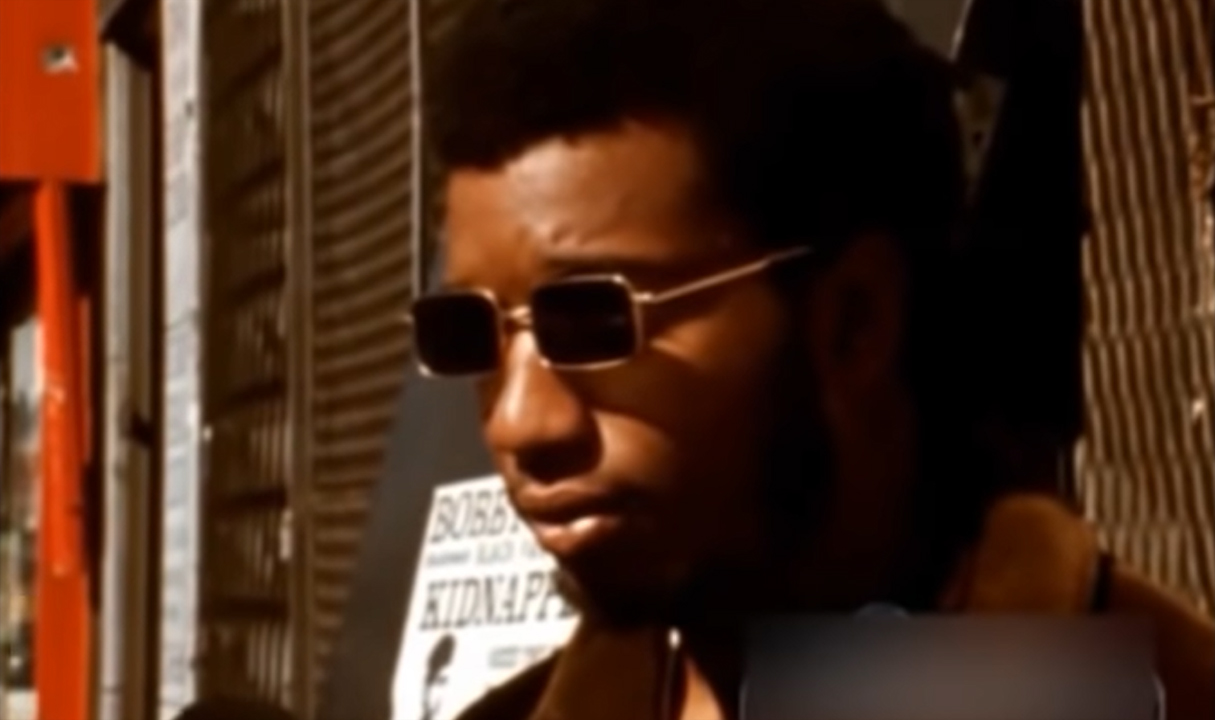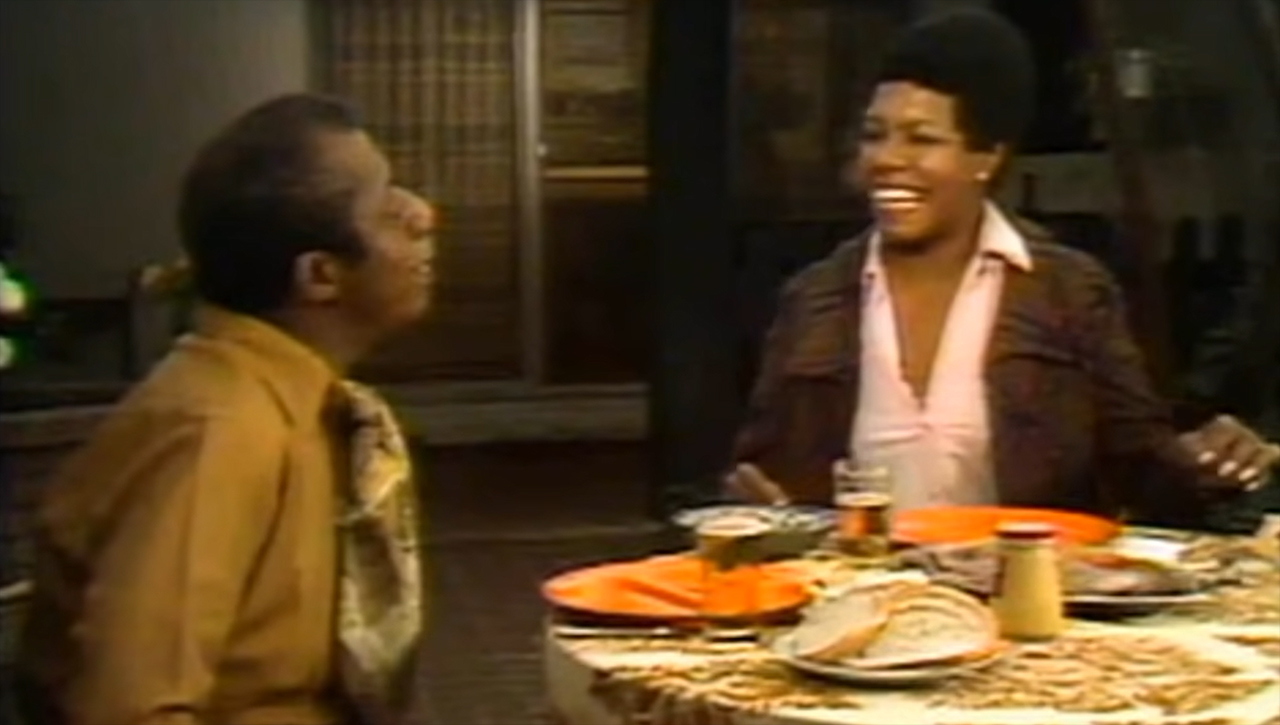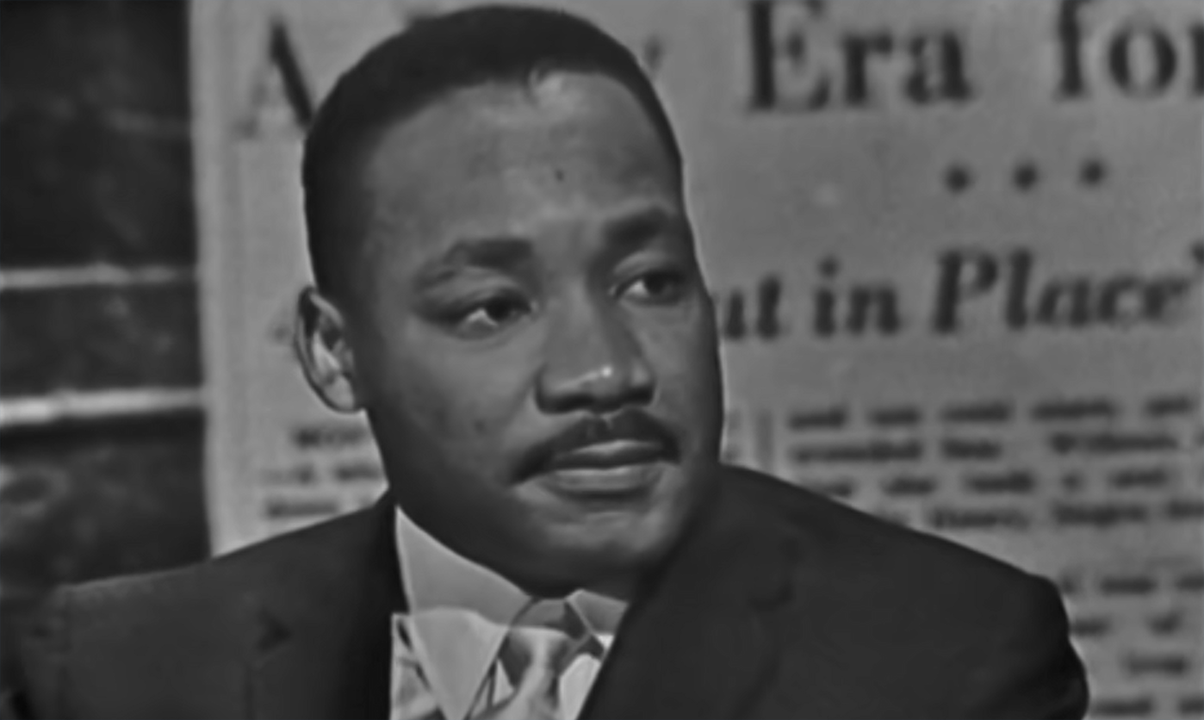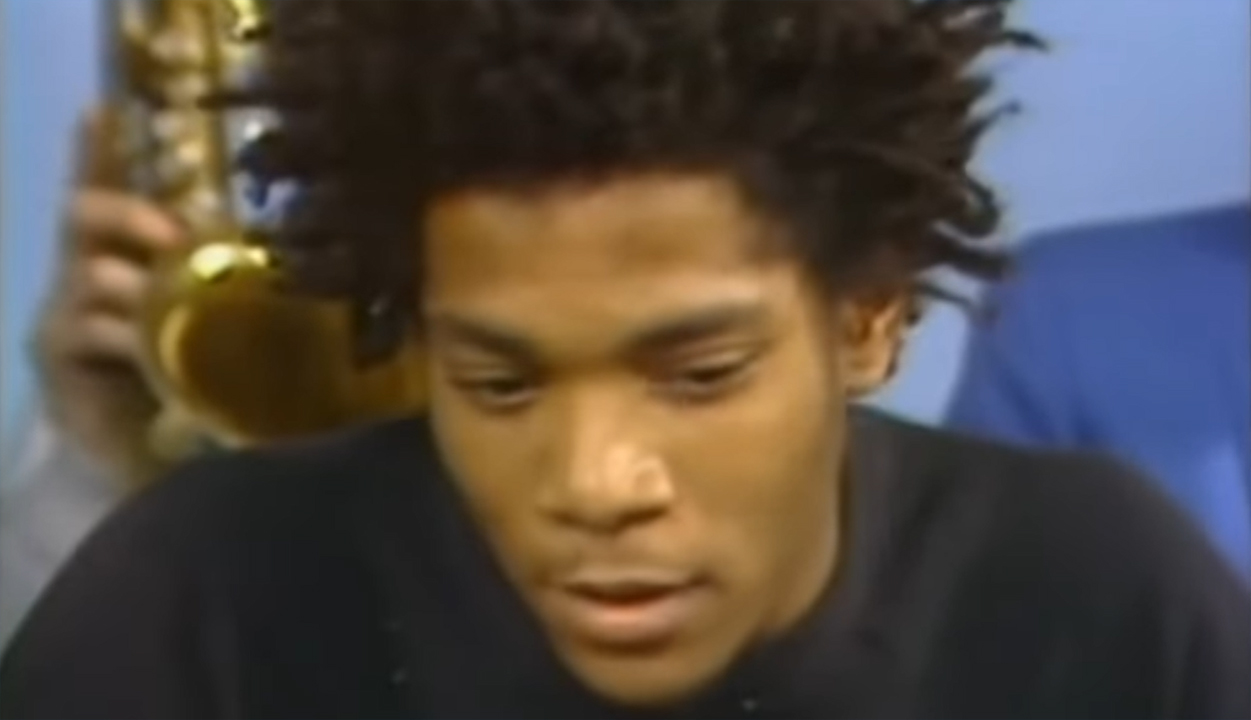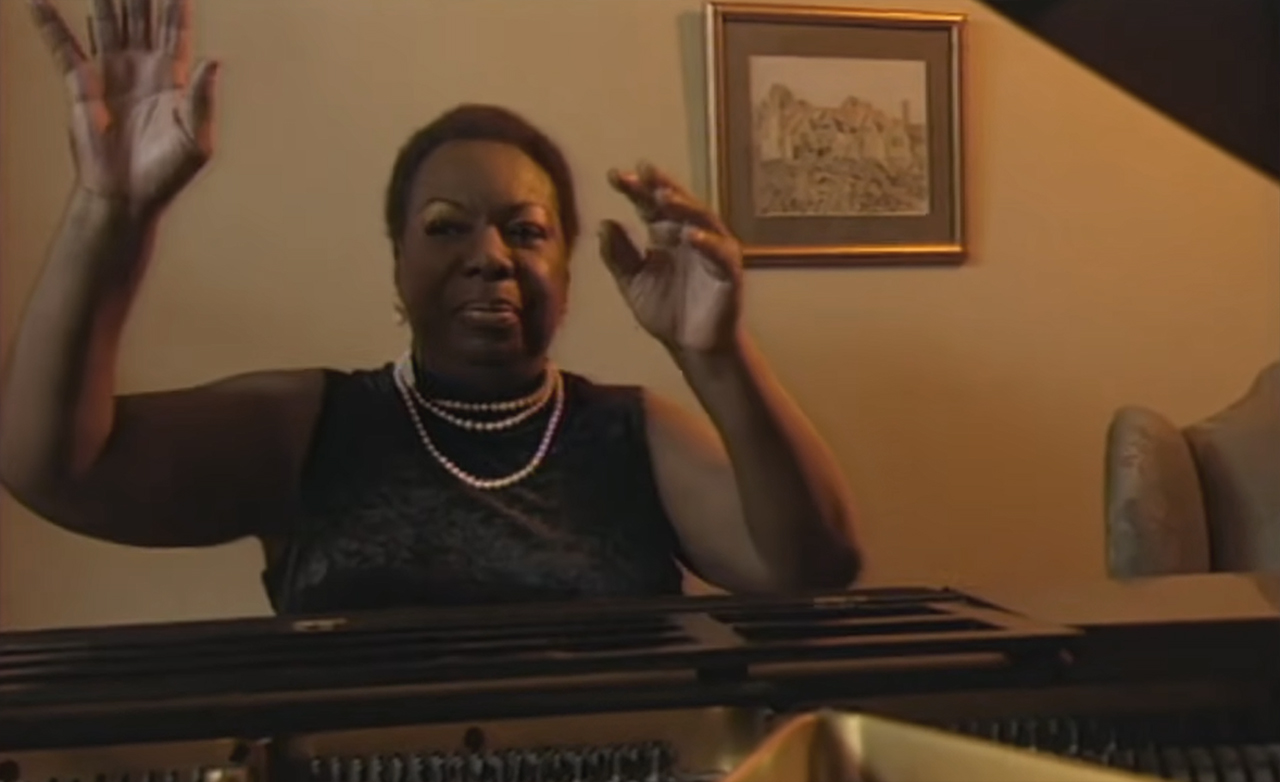
In one of her last interviews, musician and civil rights activist Nina Simone was interviewed by BBC HARDTalk in 1999. In the interview, Dr. Simone, who hold two honorary doctorates, spoke candidly about the impact her music had on the Civil Rights Movement and her work with Dr. Martin Luther King, Jr.
[Nina Simone sings for camera]
Host: Nina Simone, Dr. Simone, very warm welcome. Welcome to the program.
Simone: Thank you Tim Sebastian. You have the same name as Bach, my first love.
Host: Ah. That’s… I can’t lose with that can I?
Simone: No he can’t.
Host: He can’t, but I can. Tell me about music as a political weapon, which you’ve used it as…
Simone: Oh now, that’s a hard one. As a political weapon, it has helped me for 30 years defend the rights of American Blacks and third-world people all over the world, to defend them with protest songs. And it helps to change the world.
Host: When you get up on the stage and you sing, what’s in your mind? Just the singing or…
Simone: No, to move the audience. To make them conscious of what has been done to my people around the world.
Host: So you sing from anger?
Simone: No, I sing from intelligence. I sing from letting them know that I know who they are and what they have done to my people around the world. That’s not anger. Anger has its place. Anger has fire, and fire moves things, but I sing from intelligence. I don’t want them to think that I don’t know who they are, darling.
Host: Who are they?
Simone: They are the white people around the world with exception of Nelson Mandela, whom I met this year. I went to his marriage and his anniversary in 1998.
Host: And you weren’t disappointed?
Simone: Oh no, my God he’s a saint. He’s the greatest person on the planet.
Host: How much does fame mean to you? How much does your success mean?
Simone: My success means a great deal to me and my stage presence and being on stage means a great deal to me. My music is first in my life.
Host: And what’s second? What do you sacrifice for your music? Everything?
Simone: I don’t sacrifice anything for my music. But secondly, I would love to be married. You know, I think I married the cameraman over there. But I would love to be married. I have a man of my own but that’s second to my music. My music. Nothing takes its place. Nothing.
Host: You’ve been married before.
Simone: I’ve been married twice.
Host: Have you been unlucky at love?
Simone: Yeah, unlucky at marriages, not so unlucky at love.
Host: Lots of love, few marriages.
Simone: Yes. Two marriages.
Host: Why didn’t they work out?
Simone: The music got in the way in the one where I married the cop of the United States. The music got in the way and he treated me like a horse. You know, a non-stop workaholic horse. And the one in Tunisia, well that was very hot like a like a volcano and his family didn’t want him to move to France, and France didn’t want him because he’s an North African.
Host: And the volcano didn’t last?
Simone: Nobody lasted long enough for me never to forget it, I’ll tell you that.
Host: Among all the unforgettable things and unforgettable people in your life, there was Martin Luther King.
Simone: Oh yes. Well, I marched with him I knew him. I composed a song for him. I knew his wife, all his children, and I was in the Selma March with him and the march on Alabama at Miles College in Alabama. And the march on Washington, I was right beside his side.
Host: We saw the public face of him. We saw the public man. What was he like in those private moments when he was out of the
public?
Simone: Oh darling, he was always on stage. His dedication was of such immense proportion that he never forgot for a minute that he was there to lead my people. He never forgot that for a minute. And when he was not on stage, he was still on stage. He was always talking about equal rights.
Host: You’ve said in the past that you would have worked to try to get him to the presidency do you think realistically that he could ever had a shot at the presidency?
Simone: Yes he could of, baby! He could have if we if he hadn’t gotten killed and we’d had a little bit more support.
Host: You really think that America was ready for a Black president.
Simone: Yes, I do.
Host: Because even Black politicians in Washington these days say they don’t think that’s the case.
Simone. Well not now! Jesse Johnson was no match for him. There’s not been a man since then, and his dream came true with Nelson Mandela. Because Nelson got it done in South African.
Host: So the same thing that was done in South Africa…
Simone: Could have been done in the United States. Yes, I distinctly believe that. I need a cigarette. You’re making me hot. Can I have a light, please. [Simone speaks to someone off camera.] Go ahead.
Host: How did you feel when he died?
Simone: Oh God, man. I was devastated. I wrote a song in his honor the next day called “The king of love is dead.”
Host: How much did that devastate you? What did it do to you?
Simone: I think I must have cried for two weeks. And it killed my inspiration of the civil rights movement… I’m ready… [Simone speaks to someone off camera.] in the United States, and I moved away.
Host: You were also scared weren’t you because of all the killing that was going on…
Simone: Yes, I was scared.
Host: Because Jack Kennedy was killed. Robert Kennedy was killed. Did you think they were coming after you?
Simone: Not only that, the FBI was after me.
Host: They had a file on you, didn’t they?
Simone: Mmmhmm, in Washington.
Host: You never saw it, did you?
Simone: Uh no, we were told about it and it’s in my book I wrote a book called “I put a spell on you,” and in there. and I did a film called “Nina Simone, a legend” and it’s in there that the FBI has a file on me and they indeed they went to Curtis Institute of Music where I was rejected as a for a scholarship and asked Vladimir [unintelligible] if I had ever been mixed up in the rebellion and he said they never found anything but they actually went to Curtis Institute and inquire about me.
Host: Dr. Simone, you were born in North Carolina?
Simone: Yes I was.
Host: You were very poor?
Simone: Yes, very poor! Lot of love.
Host: Lot of love, but not much to eat?
Simone: Uh, at times. My mother had a saying. She’d say “well, we don’t know where we’re going to get dinner tonight but I’ll pray and it’ll come.” And sure enough she prayed, and it came. She’s been a minister for 57 years. She’s now 97 years old.
Host: And you first sang in her church, didn’t you?
Simone: Mmmhmm.
Host: What was that like?
Simone: Oh it was… it was fun because I had never studied the piano. I was a child prodigy so when they got up and started shouting I started playing.
Host: Literally sat down and…
Simone: Started playing. The first song I played was “God be with you till we meet again.” I played that at 3 years old.
Host: And then you went on to train as a classical pianist?
Simone: Yes.
Host: That was your love, wasn’t it?
Simone: Yes. I’m not over yet.
Host: Are you disappointed that you didn’t in the end become what you and your parents wanted to be…
Simone: Yes, yes …
Host: Which was to be the first Black concert pianist in the state.
Simone: Yes because we don’t have any. All we have is Andre Watts and they don’t accept him very much because he’s part German. The Blacks don’t accept him but they would have accepted me.
Host: At the age of 12 you were playing in a library weren’t you?
Simone: Yeah…
Host: In music library.
Simone: It was my first recital.
Host: And something happened. Somebody said something to your parents. What did they say?
Simone: Yeah, they put them in the back of the room to watch me and I got up bravely, I was only 12 and I said if my parents don’t sit in the front seat I don’t play.
Host: And they would put that because they were Black?
Simone: That’s right.
Host: How did that make you feel?
Simone: It was my first encounter with racism. My favorite record that I listened to now is Marian Anderson who is the first, the world’s first Black contralto. I listen to her every morning. She wakes me up and gives me inspiration to start the day. She sings a song “Oh rest in the Lord, wait patiently for him and he will give you your heart’s desire, and he will give you your heart’s desire.”
Host: Religion is deeply ingrained in you?
Simone: Deeply ingrained.
Host: All religions?
Simone: All religions. I don’t believe in any one religion. No I don’t believe in any one religion. I believe in Allah. I believe in the Hindu religion because I studied yoga for 21 years. I believe in Buddhism. I believe in all of them because they’re necessary for the sheep, darling. The Sheep have something to follow and religion is necessary. I believe in all of them.
Host: So when you got turned down by the Curtis School in Philadelphia, you needed to make some money, didn’t you?
Simone: Yes, I did to help my parents.
Host: So you started playing in bars and supper parties?
Simone: Yes, I did.
Host: What was that like?
Simone: It was awful.
Host: But it got you some money.
Simone: Got me $90 dollars a week, $50 of which I gave my parents.
Host: And they came to Philadelphia to be close to you?
Simone: Yes they did.
Host: What was your big break?
Simone: My big break was going to Atlantic City and playing a supper club ,and singing the song “Porgy,” which was given to me by a fan, a student there, and he liked Billie Holiday. I can’t stand her. But he liked her and he asked me if I would sing it. So since I didn’t have to practice the piano while I was cleaning up my room in Atlantic City to work every night from 9:00 to 4:00 I learned the song and first sang it there in a bar and an agent heard me, and took me to New York and put it on a record.
Host: And then in 1957 came Carnegie Hall.
Simone: That’s right.
Host: Huge success, wasn’t it?
Simone: Yes, it was.
Host: Something disappointed you because you wrote a letter parents didn’t you?
Simone: I don’t remember that now.
Host: You apparently wrote a letter to your parents saying this is where you wanted me to play but I should have been playing…
Simone: Bach, yes I did.
Host: Your favorite composer.
Simone: I did, I did do that.
Host: So this was your glory occasion but you were still disappointed.
Simone: Well I love the audience but I wasn’t playing classical music and I wanted to be and so I wrote and I quote again what you have just said I wrote yes, I’m in Carnegie Hall finally but I’m not playing Bach.
Host: And then “My baby just cares for me.”
Simone: Oh well now that’s years later.
Host: Years later but it was huge.
Simone: Yes, it was huge.
Host: It started out of the song for an ad wasn’t?
Simone: No, it started out as a piece of play-doh for children in England. It started out as a video for children and then it got bigger and bigger, and everybody started to hear it and it became very famous and it’s the most famous song I have recorded.
Host: People say it turned you from cult into legend.
Simone: Yeah I think right yeah I think so.
Host: So you knew after that you were on your way?
Simone: Yeah I was on my way before that because let’s face it I’ve been playing, I was playing around the world before then. I heard about it in Switzerland.
Host: When you left America in 1972, you left because you couldn’t stand…
Simone: Racism.
Host: Just that?…
Simone: Racism.
Host: You couldn’t stand it any longer?
Simone: Couldn’t stand it!
Host: Walking down the street?
Simone: Crossing the street. You get racism crossing the street. You get it… it’s in the very fabric of American society.
Host: You can’t stand to go to America?
Simone: No, I can’t. I went this year for the first time. Right? Two times, and I worked at Newark new stadium and Seattle. They were so happy and surprised to see me because they hadn’t seen me in how many years, Clifton? In seven years.
Host: But you didn’t feel well treated.
Simone: This time, yes, this time they were more than happy to see me. They haven’t seen me so long they thought I was dead.
Host: But you wouldn’t go back?
Simone: No way!
Host: And you keep telling them that?
Simone: No way am I ever going to ever go back there and live. And I’m not the only one. Josephine Baker went back twice and after her, second time she never went back.
Host: So you traveled to Liberia didn’t you?
Simone: Oh yeah.
Host: And that was apparently the happiest time in your life?
Simone: It was.
Host: Why?
Simone: I was at home and you remember that Liberia had a liaison with America, so it was known as a place for Blacks whom they could not contain and they were all rich, I lived on the beach, I had house servants the and the president’s daughter gave me a house on the beach I stayed on the beach every damn day it was fantastic I was happier there and what’s more I got engaged to the foreign minister’s father, who was at that time 70 years old.
Host: But he was killed wasn’t he?
Simone: Yes he was killed. They killed 13 of them.
Host: In a coup.
Simone: In a coup.
Host: Life seems to have gone wrong for you.
Simone: No, I wouldn’t say that. My music has always lifted me and I’ve had a few love affairs that have lifted me. Life hasn’t gone wrong for me. I’ve been unlucky, no I haven’t been, no I have no complaints about my life.
Host: But in 1978, in England, you told a newspaper my personal life is a shambles. I’m Black and I’ve been struggling for half my life.
Simone: Well that’s true. My personal life was a shambles and it still is. I don’t have a lover I have a friend but not a lover. My personal life has been a shambles because everything has had to be sacrificed for the music.
Host: But then there were reports in the late 70s of a drug overdose…
Simone: No, no, no…
Host: Running out of money…
Simone: I ran out of money…
Host: Being homeless.
Simone: I wasn’t homeless. I’ve never been homeless. That’s a lie.
Host: You’ve also seemed to have had a lot of problems with the music industry.
Simone: Yeah for God sakes they don’t pay you. I still have 60 albums being pirated in England right now.
Host: Nobody’s actually paying you for them.
Simone: No. I have a great lawyer from San Francisco and he goes after as many pirates as he can but he can’t
catch them all. They run the streets too fast. I’ve been pirated all over the world.
Host: When you get up on a stage now, and they said this in 1987 when you were at Ronnie Scott’s jazz club in London, they said you get the whole Nina Simone when she comes up on the stage, you get her mood, you get her monologue, you get the music. Is this the whole Nina Simone experience when you get up on stage?
Simone: That’s true.
Host: And you keep them waiting until you’re ready?
Simone: That’s right. All the time.
Host: Why?
Simone: Why? Because I have to be composed. I have to be poised. I have to remember what my first piano teacher taught me: you do not touch that piano until you are ready and until they are ready to listen to you. You just make them wait.
Host: How do you judge that moment?
Simone: Oh, I judge it from my… from my head and from my instincts.
Host: And then when it’s ready, then when you’re happy, and the crowd is happy…?
Simone: When they’re ready, I play for them.
Host: Is it always a buzz, is it always a huge kick for you?
Simone: Yes it’s always a huge kick.
Host: Does it get better through the years?
Simone: Yes it does.
Host: In what way?
Simone: You’re here.
Host: In what way? Do you still enjoy it as much?
Simone: Oh yes! I enjoy it as much.
Host: You’re happy to keep traveling as much as you do? I mean you’re on the road constantly. Never get tired?
Simone: Yes I get very tired. I stay tired. But I don’t mind being on the road for my music.
Host: Before I let you go, one question: There is a report that a business meeting once you pulled out a knife.
Simone: I sure damn did!
Host: Did you?
Simone: Yes, I did.
Host: Why?
Simone: Because [expletive]. [Simone laughs]. Oh dear. Because there was a record company…
Host: You were about to say something you shouldn’t…
Simone: I can’t say. There was a record company that stole my album and didn’t pay me, and they came to Switzerland and
I said “where’s my money?” They said “we’re not going to give you any money,” I said “Oh yes you are!” And I got a gun, it was a gun, it wasn’t a knife — and I followed them to a restaurant and I tried to kill him. I missed him and I went back to America.
Host: You actually pulled the trigger?
Simone: Oh [expletive]. [Simone laughs.] Excuse me. Yes I did. [Simone laughs].
Host: And felt better for it all?
Simone: Yes! Sorry I didn’t get him!
Host: So, now we’ve advertised that side of your life, and you say that you’re still looking for a lover. People… men are going to be a bit nervous of you.
Simone: They are very.
Host: Do you manage to put them at ease?
Simone: No.
Host: And you don’t try too hard?
Simone. No, I don’t try… Yes I try hard, but I refuse to cook or to clean.
Host: So they’re going to take you as you are?
Simone: They have got to take me as I am, and recognize that I’m a star, as well as a woman and they have to deal with the two.
Host: And treat you properly?
Simone: Definitely.
Host: Nina Simone. Dr. Simone it’s been a great pleasure having you on the program.
Simone: Can I say one more thing? I’m a doctor. Do you know why?
Host: You’re a doctor of humanities.
Simone: Yes, from the Malcolm X University in Chicago.
Host: And a doctor of muic …
Simone: From Amherst College in Amherst, Massachusetts.
Host: Thank you for setting the record straight. It’s been a great pleasure.

Blog dedicated to news and viewpoints from Black journalists who support, and inform, communities of color.
Original content, and curated articles, are posted and updated daily.

